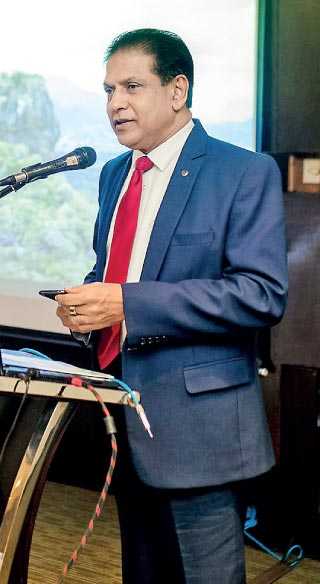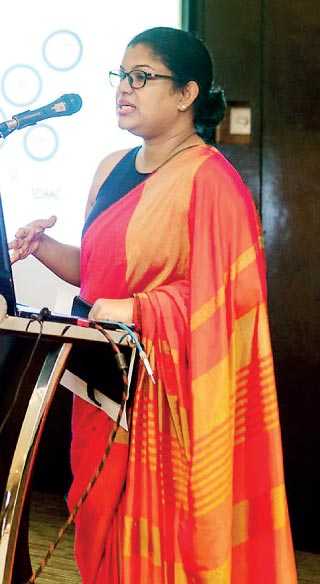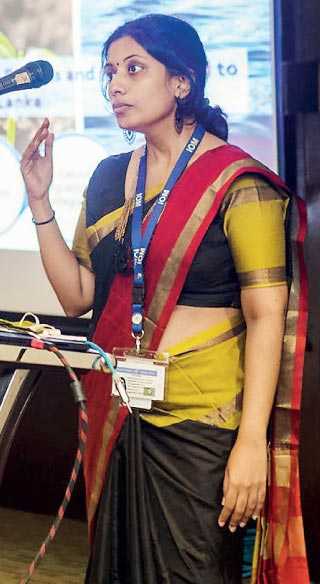Friday Feb 20, 2026
Friday Feb 20, 2026
Friday, 2 October 2020 00:00 - - {{hitsCtrl.values.hits}}

Ministry of Irrigation Secretary D.M. Anura Dissanayake

SLYCAN Trust Executive Director Vositha Wijenayake

IOM Sri Lanka Senior Project Coordinator, Migration, Environment and Climate Change Rangitha Balasuriya
Climate change greatly influences the patterns of human mobility in Sri Lanka. It exacerbates existing economic, demographic, social, and environmental drivers of migration and contributes to more frequent and intense disasters and displacement.
To identify and enhance the integration of migration and displacement into climate-related policies and plans to address the needs of the vulnerable population, SLYCAN Trust in collaboration with the International Organisation for Migration – Sri Lanka and the Maldives organised an expert consultation on Thursday, 3 September, on the ‘Integration of Climate-Induced Migration into Policies and Plans Related to Climate Change’.
Present at the consultation was Secretary to the Ministry of Irrigation D.M. Anura Dissanayake who discussed changing rainfall patterns, water scarcity, and drought that are among the most severe impacts of climate change in Sri Lanka and highlighted the need for sustainable water management and large-scale irrigation.
“Water is a key factor which contributes to migration. To address the water needs, there have been immediate, medium, and long-term investments set aside, some of which include distributing water to drought-prone areas in the South, North East, and North-Western Provinces and also to store and distribute water efficiently to help mitigate the risk of floods. One such measure is the Nilwala Project. This will help provide water for drinking, agricultural, and industrial purposes for areas including Monaragala and Hambantota in the next decade and establish Sri Lanka’s first trans water basin,” said Dissanayake.
The nexus of climate change and human mobility is complex, with connections and interdependencies to policies, plans, and processes across different sectors, including agriculture, sustainable development, risk management, health, education, social security, and environmental protection.
“People are often willing and compelled to migrate for various reasons, and they often relate migration with international migration. However, many migrate internally for agricultural or educational purposes, moving frequently from one place to another. It is not uncommon for internal migrants to have some aspect of climate change including slow onset events such as droughts that affects their decision to migrate internally,” said IOM Sri Lanka Senior Project Coordinator, Migration, Environment and Climate Change Rangitha Balasuriya.
She went on to say that a large part of the country’s population depends on the agriculture sector either directly or indirectly and there are many who are left seeking opportunities.
“Currently, Sri Lanka’s national laws and policies do not address the issue of climate change migration and there has been a significant increase in the number of climate change-related disasters. When discussing climate vulnerabilities, it is important to focus on the impact of those left behind, specifically for vulnerable groups including women, men and youth, and how differently it impacts them,” said Climate Change Secretariat Assistant Director Ruwan Weerasooriya.
This discussion comes at a time when Sri Lanka’s Nationally Determined Contributions are undergoing their review process.
“There has been an increase in the number of disasters that take place annually. Climate change is a contributing factor to increasing migration and displacement. There has been migration or dimensions of human mobility taking place in the form of temporary and permanent internal migration, cyclic economic migration and departures for foreign employment. In some of the fieldwork we have been conducting in the Anuradhapura and Trincomalee districts, it has been noticed that a vast majority of farmers experience drought and irregular rainfall patterns which lead to reduced crop yields and in turn to temporary migration between the harvesting seasons. Temporary migration in Sri Lanka’s dry zone is very common as there have not been good enough conditions for farming,” said SLYCAN Trust Executive Director Vositha Wijenayake.
SLYCAN Trust works to contribute to the collective local and global efforts to address the impacts of climate change, wildlife, as well as social and economic issues hindering social justice. The organisation achieves these objectives through policy advocacy, action campaigns, ground-level action, outreach and networking with like-minded organisations, awareness creation, and capacity building.